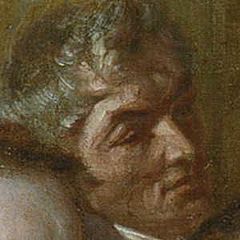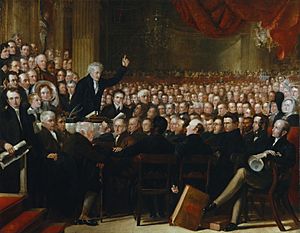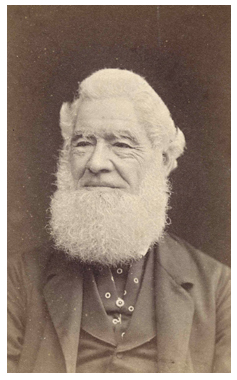Samuel Bowly facts for kids
Quick facts for kids
Samuel Bowly
|
|
|---|---|

Bowly at the 1840 Anti-Slavery conference
|
|
| Born | 1802 |
| Died | 1870 |
| Nationality | English |
| Known for | Slavery abolitionist, Temperance |
| Spouse(s) | Miss Shipley & Mrs Cottrell |
Samuel Bowly (1802–1884) was an important English activist. He worked hard to end slavery and encouraged people to stop drinking alcohol.
Contents
Early Life and Business
Samuel Bowly was born in Cirencester, England, on March 23, 1802. His parents were Sarah and Samuel Bowly. His father was a miller in Bibury, Gloucestershire. Samuel learned a lot about business from his father.
In 1829, Samuel moved from Bibury to Gloucester. There, he started his own business selling cheeses. He was also part of the board for the Birmingham and Gloucester Railway.
A Leader in Business
Samuel Bowly became a very respected person in Gloucester. He was in charge of many local companies. These included banks, gas companies, and railway companies. For the last 20 years of his life, he was a top leader in business.
Fighting for Change
Samuel Bowly believed in making society better. He supported important movements of his time.
Ending the Corn Laws
He played a big part in the fight against the Corn Laws. These laws made food, especially bread, very expensive for ordinary people. Samuel supported leaders like Richard Cobden and John Bright. They wanted to make food cheaper for everyone.
Education for All
Samuel also wanted all people to have access to good education. He helped start British and ragged schools in Gloucester. These schools helped poor children get an education. He believed the country should have a system for everyone to learn.
His Faith and Beliefs
Samuel Bowly was a member of the Society of Friends, also known as Quakers. Quakers are a religious group known for their peaceful beliefs and work for social justice. He also supported "disestablishment." This meant he wanted to separate the official church from the government.
Fighting Against Slavery
Samuel Bowly was very active in the movement to end slavery. He spoke out strongly against it.
Debating for Freedom
He once debated against Peter Borthwick, who supported slavery. Samuel's powerful speeches helped him win the argument. He convinced many people that slavery was wrong.
Meeting with Leaders
On November 14, 1837, Samuel was part of a group that met with Lord Melbourne. Lord Melbourne was the Prime Minister at the time. They talked about the cruel treatment of slaves under the "apprenticeship system." This system was supposed to prepare slaves for freedom, but it was often very harsh.
Helping End Apprenticeship
The next year, Samuel helped form the Central Negro Emancipation Committee. This group worked to end the unfair apprenticeship rules. Their efforts helped get rid of these bad regulations.

The World Anti-Slavery Convention
In 1840, the British and Foreign Anti-Slavery Society was created. Its goal was to end slavery all over the world. Soon after, the first World Anti-Slavery Convention was held in London. People from many countries attended. Samuel Bowly was there. He is shown in a famous painting of the event called The Anti-Slavery Society Convention, 1840 by Benjamin Haydon.
Promoting Temperance
Samuel Bowly became most famous for his work in the Temperance movement. This movement encouraged people to stop drinking alcohol.
Starting a Teetotal Society
On December 30, 1835, Samuel promised to completely stop drinking alcohol. This is called "total abstinence." He then started a teetotal society in his own city of Gloucester.
Spreading the Message
One of his first missions was to talk to other Quakers about temperance. He traveled with Edward Smith of Sheffield across Great Britain and Ireland. They encouraged many people to join the movement. In his later years, he often held small meetings in people's homes to discuss temperance.
Later Life and Legacy
Samuel Bowly's 80th birthday was celebrated in Gloucester in 1882. He passed away in Gloucester on March 23, 1884. This was his 82nd birthday. He was buried on March 27. Many people, both rich and poor, came to his funeral. This showed how much he was respected.
His Family
Samuel Bowly married twice. His first wife was Jane Shipley. His second wife was Louisa Cotterell. She was the widow of Jacob Henry Cottrell.
Writings
Samuel Bowly also wrote several speeches and letters. These helped share his ideas.
- A Speech delivered 1 Oct. 1830 at a meeting to petition Parliament for the Abolition of Negro Slavery (1830)
- Speech upon the present condition of the Negro Apprentices (1838)
- A Letter to J. Sturge on the Temperance Society and Church Rates, by L. Rugg, with a reply by S. Bowly (1841)
- An Address to Christian Professors (1850)
- Total Abstinence and its proper Place (1863)
 | James B. Knighten |
 | Azellia White |
 | Willa Brown |


